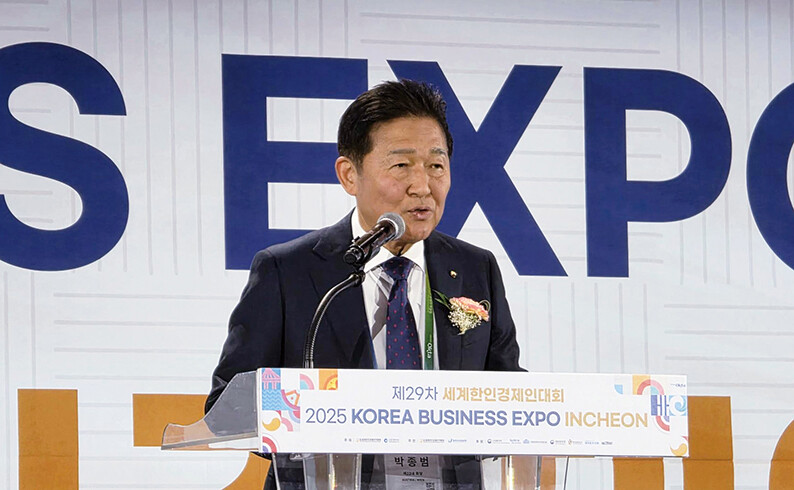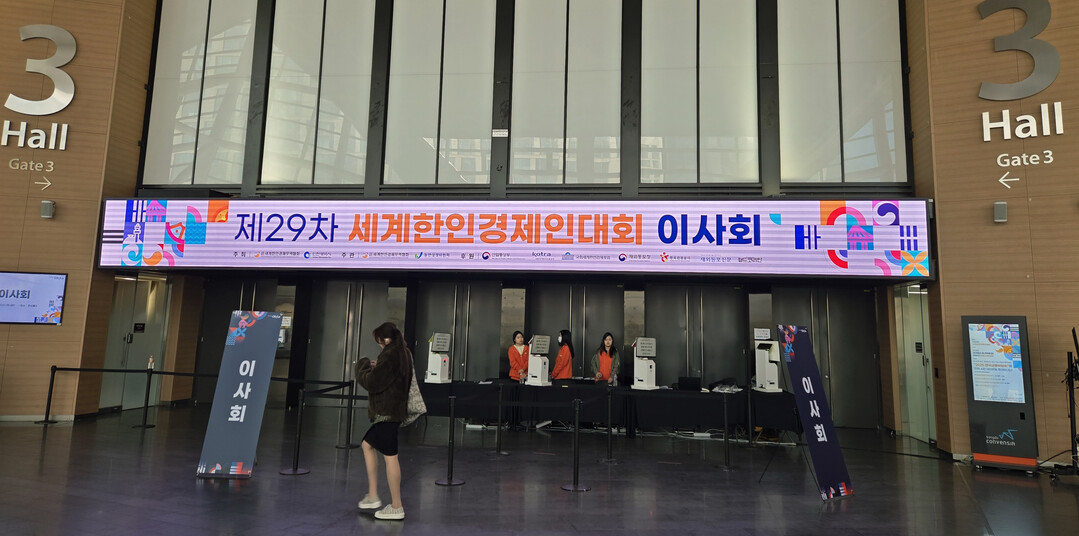
The successful re-election of World-OKTA (World Federation of Overseas Korean Traders Associations) Chairman Park Jong-bum to the 23rd presidency is analyzed as a strong affirmation of the association's commitment to focusing on the core objectives of strengthening organizational transparency and supporting Korean Small and Medium-sized Enterprises (SMEs) in their overseas market entry. Chairman Park secured his re-election on the last day of the convention, the 29th, by gaining 186 votes (51%) out of 365 attendees at the Board of Directors meeting, and will lead World-OKTA for the next two years. This signifies official internal recognition of his leadership, which was based on ethical management and tangible economic achievements during his previous 22nd term. The Park administration is expected to continue for the next two years, concentrating on solidifying the association's institutional foundation and maximizing its practical economic diplomacy capabilities.
This re-election success carries several significant implications that will determine World-OKTA's future strategic direction. First, the election result reflects the members' decision to prioritize ethical governance within the association. In contrast to past organizational controversies, Chairman Park aggressively implemented reform measures to enhance transparency, which played a decisive role in earning the trust of the members. Second, the most critical strategic goal for the 23rd term is the enactment of the "World-OKTA Special Act (Overseas Korean Traders Association Act)." This legislation is essential for designating World-OKTA as a statutory body and securing stable state support, thereby establishing the institutional foundation to elevate the association into one of the Republic of Korea's representative 'Seven Major Economic Organizations.' Third, it confirms the successful transition of World-OKTA's function from an internal networking club to a platform providing tangible export benefits to Korean SMEs. The record-high contract performance at the World Korean Business Convention held in Europe is evaluated as successful evidence of this strategic shift.
Chairman Park Jong-bum's successful re-election is a continuation of the organizational innovations achieved during his 22nd term. During this term, Chairman Park focused on significantly enhancing transparency in organizational operations by establishing an Ethical Management Committee and a Management Diagnosis Task Force (TF), introducing the principle of non-use of corporate credit cards, and forming a Labor-Management Win-Win Committee. This internal restructuring has boosted the organization's external credibility. The 23rd roadmap builds upon this internal stabilization to focus on outward-looking and future-oriented goals. Key objectives include securing institutional status through the enactment of the OKTA Special Act, alongside the regular establishment of a Global Startup Competition within the World Korean Business Convention, and the creation of concrete support systems for the future generation, such as strengthening youth overseas employment and startup support.
The 23rd World-OKTA Chairman election started as a three-way race involving three candidates, but narrowed down to an intense two-way contest between the re-election-seeking Chairman Park Jong-bum and the challenger, Cha Bong-gyu, who ran for the chairmanship for the second time. Chairman Park's re-election success is interpreted as a factual acknowledgment of his performance and efforts over the past two years.

It is important to understand the background of this election. One of Chairman Park's competitors, candidate Cha Bong-gyu, is known to have had internal conflicts related to the interpretation of the association's election management regulations and controversies, such as a request for academic background correction during the 19th election process. These past experiences may have significantly influenced World-OKTA members to choose transparent and ethical operation as a core value in this election. Therefore, Chairman Park's push for strong integrity reforms, including the establishment of the Ethical Management Committee and the principle of non-use of corporate credit cards, was not merely an administrative measure. It was a decisive strategy to restore internal organizational trust, secure the organization's long-term stability, and enhance its external reputation. The election result firmly demonstrates the members' support for this strategic direction.
The newly elected 23rd executive body includes the Chairman, along with a Board Chairman and Auditors, who are key figures that will lead World-OKTA with Chairman Park. At the Board of Directors meeting, Chairman Lee Yeon-soo (New Zealand) was elected as the Board Chairman, and Chairman Kim Won-ho (Australia) as the Auditor.
Board Chairman Lee Yeon-soo: Lee Yeon-soo, who runs a business in New Zealand, is a veteran entrepreneur who has been engaged in the trade sector for a long time. He is a successful businessman, especially in the health food sector (such as velvet antler), with an annual turnover exceeding 9 billion Korean Won. He settled in New Zealand and started his business in the 1980s. His connection with his home country's economy is deep; he has maintained ties with Daejeon and has long done business with Daedeok Bio, a biotechnology venture company at Chungnam National University. His background, which includes stable global trade operation experience and a deep connection with his home country, is expected to play a crucial role in strengthening World-OKTA's economic diplomacy capabilities.
Institutional Significance of the Executive Body: With Chairman Park (Europe/Emerging Markets expert, Youngsan Group) leading progressive legislative initiatives and startup support, and Board Chairman Lee (Oceania/Established Trade Network expert) providing a stable global trade foundation, the 23rd administration is structured with a balanced global management structure. This structure provides a foundation to effectively accommodate and integrate the diverse needs and characteristics of chapters across approximately 70 countries worldwide.
Chairman Park Jong-bum's re-election holds significant institutional meaning for World-OKTA's future strategy.
First, re-election ensures the strategic continuity essential for the 'OKTA Special Act' enactment agenda, which demands high-level political effort. Since such a large-scale legislative goal is difficult to complete within a two-year term, leadership continuity is decisive for focusing resources and political momentum over the long term.
Second, re-election is a confirmation of the internal governance reforms pursued during the 22nd term. The fact that somewhat strict transparency measures, such as the principle of non-use of corporate credit cards and the Ethical Management Committee, received support from internal members means that members prioritize the organization's permanent stability and integrity over temporary gains or traditional organizational politics. This shows that the organization has successfully transitioned to a future-oriented and sustainable operating model.
Third, stable and re-elected leadership significantly enhances World-OKTA's credibility and predictability with external stakeholders, including the Korean government, major domestic economic organizations, and international partners. Particularly at a time when the association is attempting to enact critical legislation like the "World-OKTA Special Act" and assume the role of an official national economic partner, leadership stability acts as a crucial factor in boosting the association's negotiating power and external standing.
[Copyright (c) Global Economic Times. All Rights Reserved.]






























